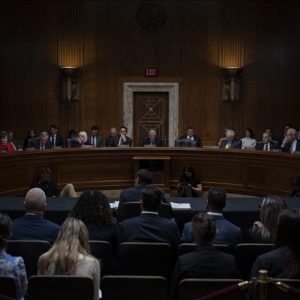Industry lobbyists fret as Sanders prepares to take over powerful senate health panel
Healthcare industry lobbyists who are used to exerting significant influence over legislation and committee activity in Washington, D.C. are fretting that they may see their sway diminish after Sen. Bernie Sanders—a vocal opponent of K Street’s outsized power—takes over the Senate’s top health panel in the new Congress.
Politico reported Tuesday that “multiple lobbyists representing health insurers, pharmaceutical companies, providers, and health systems” expressed concern that “they’re going to have to ‘bank shot’ their advocacy to get their messages across—lobbying other lawmakers on the committee and getting into the ears of progressive policymakers and left-leaning organizations.”
“Sanders’ well-chronicled antagonism toward lobbyists has some concerned they’ll be unable to blunt criticism of their clients’ profits or corporate executive salaries,” the outlet continued. “They are anxious Sanders might seek to revive policies like importing drugs from Canada and other nations, an idea loathed by drugmakers.”
Michaeleen Crowell, a lobbyist with the firm S-3 Group who previously worked as Sanders’ chief of staff, said it “will not be business as usual for K Street” with the Vermont Independent at the helm of the powerful Senate Health, Education, Labor, and Pensions (HELP) Committee.
One lobbyist said healthcare industry influence-peddlers are particularly concerned about how Sanders—a longtime champion of Medicare for All and congressional action to sharply reduce prescription drug prices—will wield the committee’s subpoena power.
“Subpoena authority is certainly something that gets people paying attention,” Rafi Prober, co-head of the congressional investigations practice at Akin Gump Strauss Hauer & Feld, told Politico, which noted that “it’s almost certain that health executives will be called to testify before the committee—a reputational risk for corporations.”
Last month, Sanders said in an interview with CNBC that subpoena power should be used “intelligently and judiciously.”
“Given the fact that we are looking at an unprecedented level of corporate greed, that we’re looking at union-busting, that we’re looking at extremely high prices in healthcare, prescription drugs that are caused by the greed of the industries—I think we have to take a hard look at these issues,” Sanders said. “And if using subpoena power becomes necessary, then that’s something we can do.”
Sanders is set to become chair of the Senate HELP Committee as the Biden administration moves to carry out provisions of a new law that, over the next few years, will impose modest constraints on the pharmaceutical industry’s vast power to set and raise prescription drug prices, which are significantly higher in the U.S. than in other wealthy countries.
By 2026, Medicare will for the first time be required to negotiate the prices of a small number of expensive prescription drugs, a change that Sanders has advocated for years—though he criticized the Inflation Reduction Act provisions as inadequate.
Originally published at Commondreams.org.










